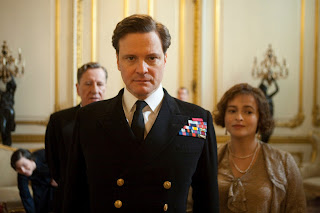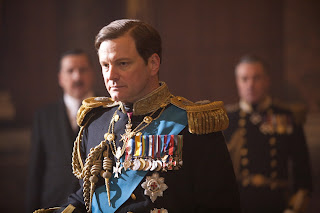The
King's Speech is a 2010 British historical drama film directed by Tom Hooper
and written by David Seidler. Colin Firth plays King George VI who, to cope
with a stammer, sees Lionel Logue, an Australian speech therapist played by
Geoffrey Rush. The men become friends as they work together, and after his
brother abdicates the throne, the new King relies on Logue to help him make his
first wartime radio broadcast on Britain's declaration of war on Germany in
1939.
Seidler
read about George VI's life after overcoming a stuttering condition he endured
during his youth. He started writing about the relationship between the monarch
and his therapist as early as the 1980s, but at the request of the King's
widow, Queen Elizabeth The Queen Mother, postponed work until her death in
2002. He later rewrote his screenplay for the stage to focus on the essential
relationship between the two protagonists. Nine weeks before filming began,
Logue's notebooks were discovered and quotations from them were incorporated
into the script.
Principal
photography took place in London and around Britain from November 2009 to
January 2010. The opening scenes were filmed at Elland Road in Leeds, which
stood in for the old Wembley Stadium. For indoor scenes, Lancaster House
substituted for Buckingham Palace, and Ely Cathedral stood in for Westminster
Abbey. The cinematography differs from other historical dramas: hard light was
used to give the story a greater resonance and wider than normal lenses were
used to recreate the King's feelings of constriction. A third technique Hooper
employed was the off-centre framing of characters: in his first consultation
with Logue, George VI is captured hunched on the side of a couch at the edge of
the frame.
Released
in the United Kingdom on 7 January 2011, The King's Speech was a major box
office and critical success. Censors initially gave it adult ratings due to
profanity, though these were later revised downwards after criticism by the
makers and distributors in the UK and some instances of swearing were muted in
the US. On a budget of £8 million, it earned over $400 million internationally
(£250 million). It was widely praised by film critics for its visual style, art
direction, and acting. Other commentators discussed the film's representation
of historical detail, especially the reversal of Winston Churchill's opposition
to abdication. The film received many awards and nominations, particularly for
Colin Firth's performance; his Golden Globe Award for Best Actor was the sole
win at that ceremony from seven nominations. The King's Speech won seven
British Academy Film Awards, including Best Picture, and Best Actor (Firth),
Best Supporting Actor (Rush), and Best Supporting Actress (Bonham Carter). The
film also won four Academy Awards: Best Picture, Best Director (Hooper), Best
Actor (Firth), and Best Original Screenplay (Seidler).
IMDB
rank: 8,2/10
Director:
Tom Hooper
Stars:
Colin Firth, Geoffrey Rush, Helena Bonham Carter
Trailer:










No comments:
Post a Comment